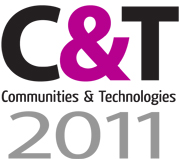Douglas Schuler: Will We Be Smart Enough Soon Enough? (Brisbane, 17 Nov 2010)
Guest Seminar by Douglas Schuler
17 Nov 2010, 2pm – 3.30pm
Queensland University of Technology
Kelvin Grove Campus, S Block, S403
Victoria Park Rd, Kelvin Grove QLD 4059, Australia
Please RSVP by 15/11/2010 to julieanne.edwards@qut.edu.au
http://www.facebook.com/event.php?eid=154584687915847
Will We Be Smart Enough Soon Enough?
Putting Civic Intelligence into Practice
Civic intelligence names a phenomenon that takes place every day but is rarely recognized for what it is. It’s a manifestation of collective intelligence that is directed towards social and environmental progress. In short, it’s focused on attaining civic ends through civic means. Civic intelligence has particular relevance to people who are involved in education and work with the people in the real world. It helps describe examples as diverse as Evergreen State College’s Sustainable Prisons Project where prisoners are engaged in biology exploration, Seattle’s all-ages music venue, the Vera Project, and the Beehive Collective where art, popular education, and political action are creatively interwoven. Civic intelligence can help us determine the relative importance of projects and help us identify directions that are most likely to be relevant and fruitful in the design of projects. One of the most important tasks facing us is asserting — and of course demonstrating — the legitimacy and effectiveness of this orientation. And, of course, this task will require that we sharpen and employ our civic intelligence.
Biography
Douglas Schuler has been focusing on the intersection of society and technology for over 25 years. He has written and co-edited several books, including Participatory Design: Principles and Practices (Erlbaum, 1994), New Community Networks: Wired for Change (Addison-Wesley, 1996), and most recently, Liberating Voices: A Pattern Language for Communication Revolution (MIT Press, 2008), a multi-year undertaking (still in-work) with 85 contributors. He is president of the Public Sphere Project and former chair of Computer Professionals for Social Responsibility. For CPSR, Doug organized the Directions and Implications of Advanced Computing symposia series which was first convened in 1987. He is also a co-founder of the Seattle Community Network, a free, public access computer network supporting community and civic engagement that first went online in 1994. He is a member of the Faculty at The Evergreen State College in Olympia, Washington, a non-traditional liberal arts college, where he teaches programs that focus on the idea of civic intelligence. Doug has a masters degree in computer science (University of Washington) and a masters in software engineering (Seattle University). He is working on his PhD.
More information about Doug at: http://www.publicsphereproject.org/
Doug is in Australia courtesy of the QUT Urban Informatics Research Lab presenting a keynote at the Research for Action workshop on 15 Nov 2010 in conjunction with Making Links 2010, Perth, WA: http://www.facebook.com/event.php?eid=101543753238750


